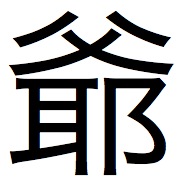I think I probably knew this kanji before, but in its grandfatherly お爺さん form; on its own, the pronunciation is じじい (which I discovered thanks to furigana in the book I was reading), and it means dirty old man. For whatever reason, when I was reading I found it very cool that a single character had three syllables in the pronunciation.
It’s a cool kanji in its own right – the character for father (父) right above the verb “to take” (取) the somewhat rare character 耶 that means question or father, making the easy mnemonic “Take this, old dad guy man! *heaves rotten tomato*” “Dad?”
But the kanji led me into the rabbit hole that is the おじいさん entry on Wikipedia. Did you know that おじいさん can refer to twelve distinct individuals? These are:
1. 父の父
2. 母の父
3. 夫の父の父
4. 夫の母の父
5. 夫の父の祖父
6. 夫の母の祖父
7. 妻の父の父
8. 妻の母の父
9. 妻の父の祖父
10. 妻の母の祖父
11. 1~2と同年代以上の高齢の男性
12. 1.や2.や11.などに相当する男性が使う自称
In translation:
1. One’s father’s father
2. One’s mother’s father
3. One’s husband’s father’s father
4. One’s husband’s mother’s father
5. One’s husband’s father’s grandfather
6. One’s husband’s mother’s grandfather
7. One’s wife’s father’s father
8. One’s wife’s mother’s father
9. One’s wife’s father’s grandfather
10. One’s wife’s mother’s grandfather
11. An elderly man of equal age or older than 1-2
12. A self-applied name used by a man who fits 1, 2, or 11
Whew…deep breath. The article goes on to explain some of the nuances of the word, comparisons with Chinese, and the fact that it can be used as a first person pronoun by old dudes when talking to young kids like their grandchildren. I can’t wait to be that crazy older uncle type and get all 爺d up.
Update: Fixed teh character issues with teh kanjiz. Also fixed the errors in 2 and 6 as pointed out by Arline. And I totally forgot to mention that the Wikipedia article also mentions that when おじいさん refers to family members, the kanji are お祖父さん.

